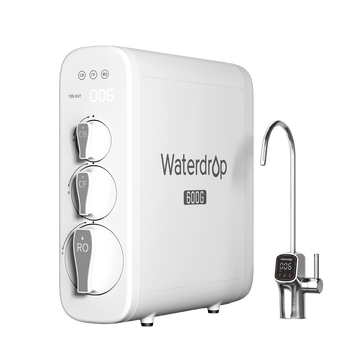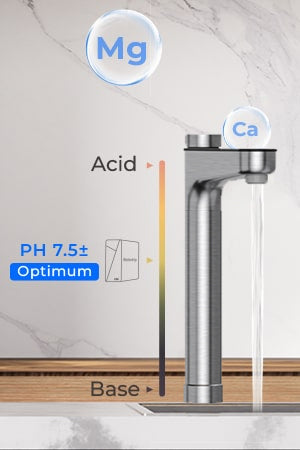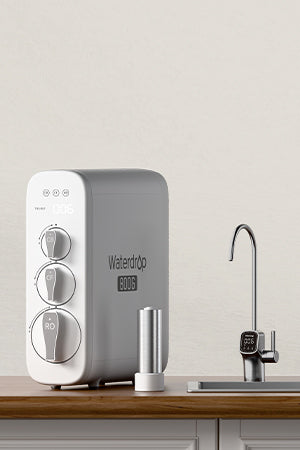L'acqua è essenziale per la vita, ma non tutta l'acqua è uguale. In molti paesi, soprattutto nelle aree con una geologia ricca di calcare, l'acqua che usiamo ogni giorno potrebbe essere quella che viene definita acqua dura. L'acqua dura, che contiene alti livelli di minerali disciolti come calcio e magnesio, può avere effetti su tutto, dalla pelle e dai capelli agli impianti idraulici ed elettrodomestici. In questo articolo del blog, esploreremo cos'è l'acqua dura, la durezza dell'acqua e come gestirla in casa utilizzando soluzioni come i sistemi a osmosi inversa (RO).
Cos'è l'acqua dura?
L'acqua dura è un'acqua che contiene elevate concentrazioni di minerali disciolti, principalmente ioni di calcio (Ca²⁺) e magnesio (Mg²⁺). Questi minerali provengono dall'erosione di rocce e terreno, come calcare e gesso, causata dal passaggio dell'acqua piovana. L'acqua dura non è dannosa da bere, ma può creare diversi problemi pratici quando viene utilizzata per le faccende domestiche, per lavarsi e cucinare.
Fonti comuni di acqua dura
L'acqua dura è un problema diffuso in molte regioni, in particolare nelle aree con alti livelli di calcio e magnesio.
Alcuni paesi presentano problemi di acqua dura più evidenti a causa della loro geologia.
- Regno Unito: città come Londra e Birmingham sono note per l'acqua dura, che spesso provoca l'accumulo di calcare negli elettrodomestici e negli impianti idraulici.
- Francia: è noto che zone come Parigi e parti della Francia meridionale hanno acqua relativamente dura.
- Germania: la durezza dell'acqua varia da paese a paese: nelle regioni meridionali l'acqua è più dura rispetto a quelle settentrionali.
- Spagna: città come Madrid e Barcellona, soprattutto nelle zone centrali e orientali, sono spesso colpite dalla durezza dell'acqua.
Quali sono le cause dell'acqua dura?
Quando l'acqua piovana scorre attraverso il terreno, dissolve minerali come calcio e magnesio dalle rocce. Questi minerali si fanno strada nelle falde acquifere, raggiungendo infine i nostri rubinetti. La durezza dell'acqua aumenta nelle regioni in cui il substrato roccioso è ricco di calcare, gesso o gesso. Al contrario, le aree con substrato roccioso granitico o dove l'acqua è fluita su rocce più tenere tendono ad avere acqua più dolce.
Segnali che indicano che l'acqua è dura
Può essere difficile determinare se l'acqua è dura semplicemente dal sapore, poiché i minerali presenti sono solitamente inodori e insapori. Tuttavia, ci sono alcuni segnali rivelatori che possono segnalare la presenza di acqua dura in casa.
- Residui di sapone e calcare: potresti notare delle macchie bianche e gessose sui rubinetti, sui soffioni della doccia o sulle piastrelle. Si tratta di calcare, che si forma quando il calcio e il magnesio presenti nell'acqua dura reagiscono con il sapone.
- Pelle e capelli secchi: l'acqua dura può seccare o irritare la pelle e rendere i capelli opachi e difficili da gestire.
- I vestiti sembrano sporchi: il bucato lavato con acqua dura può apparire sbiadito o rigido.
- Riduzione dell'efficienza degli elettrodomestici: elettrodomestici come lavastoviglie, bollitori e lavatrici possono accumulare calcare, che può ridurne l'efficienza e la durata.
Come si misura la durezza dell'acqua?
La durezza dell'acqua viene solitamente misurata in parti per milione (ppm) o milligrammi per litro (mg/L) di carbonato di calcio (CaCO₃). Generalmente,
durezza dell'acqua possono essere classificati nelle seguenti categorie.
- Acqua dolce: mgL
- Acqua moderatamente dura: mgL
- Acqua dura: mgL
- Acqua molto dura: mgL e oltre
L'impatto dell'acqua dura
L'acqua dura può sembrare un problema di poco conto, ma può causare seri problemi all'impianto idraulico e agli elettrodomestici. Con il tempo, minerali come calcio e magnesio si accumulano, compromettendo sia l'efficienza degli elettrodomestici che la durata dell'impianto idraulico. Ecco come l'acqua dura influisce sulla tua casa.
Effetti su impianti idraulici ed elettrodomestici
Uno dei problemi principali dell'acqua dura è l'accumulo di calcare (carbonato di calcio) in tubi, caldaie ed elettrodomestici. Nel tempo, questo può ostruire i tubi, ridurre il flusso d'acqua e danneggiare elettrodomestici come scaldabagni, lavastoviglie e macchine da caffè. Ad esempio:
- Scaldabagni: l'accumulo di calcare negli scaldabagni può ridurre l'efficienza del riscaldamento e aumentare le bollette energetiche.
- Lavastoviglie: i minerali presenti nell'acqua dura possono causare macchie e pellicole sulle stoviglie, nonché danni alle parti interne delle lavastoviglie.
- Lavatrici: l'accumulo di calcare può ridurre l'efficienza delle lavatrici e causarne un'usura più rapida.
Problemi di pelle e capelli
I minerali presenti nell'acqua dura possono interagire con sapone e shampoo formando un residuo insolubile, che può seccare la pelle e rendere i capelli deboli. Nel tempo, l'esposizione frequente all'acqua dura può causare:
- Pelle secca e pruriginosa: l'acqua dura può privare la pelle dei suoi oli naturali, causando irritazione e secchezza.
- Capelli opachi: i capelli lavati con acqua dura possono perdere morbidezza e lucentezza, diventando più difficili da gestire.
Problemi di lavanderia
L'acqua dura può influire sul bucato in diversi modi. I vestiti lavati in acqua dura possono risultare ruvidi o rigidi, e i bianchi possono apparire opachi o grigi anziché brillanti e puliti. L'accumulo di residui di sapone può anche ostacolare l'efficacia dei detersivi, con conseguente riduzione dell'efficacia del lavaggio.
Come gestire i problemi di acqua dura in casa?
Esistono diversi modi per ridurre la durezza dell'acqua e alleviare i problemi ad essa associati in casa. Uno dei metodi più efficaci è l'utilizzo di un addolcitore d'acqua o di un sistema a osmosi inversa (RO).
Addolcimento dell'acqua
Un addolcitore d'acqua è un dispositivo che sostituisce gli ioni di calcio e magnesio con ioni di sodio, "addolcendo" efficacemente l'acqua. Sebbene gli addolcitori d'acqua siano soluzioni comuni per risolvere il problema dell'acqua dura, non sono sempre ideali per tutte le famiglie, poiché aggiungono sodio all'acqua. Inoltre, in genere necessitano di manutenzione, come il rabbocco del sale.
Sistemi di osmosi inversa
Per una soluzione più avanzata,
sistemi di osmosi inversa Sono una scelta popolare nelle case con acqua dura. Un sistema a osmosi inversa (RO) utilizza una membrana semipermeabile per ridurre non solo calcio e magnesio, ma anche altri contaminanti, come cloro, piombo e metalli pesanti. Il risultato è un'acqua pulita e purificata, più dolce e priva di impurità.
Un'ottima opzione per i proprietari di casa è il sistema a osmosi inversa Waterdrop G3P600. Il suo design elegante e senza serbatoio è abbinato a prestazioni impressionanti, tra cui una velocità di filtrazione di 2270 litri al giorno e un rapporto acqua/acqua di scarico di 2:1, riducendo gli sprechi d'acqua. Certificato per la riduzione dei TDS e realizzato con materiali senza piombo, il G3P600 garantisce acqua dolce e sicura. Con una filtrazione a 8 stadi, riduce efficacemente contaminanti come fluoro, cromo e metalli pesanti. Inoltre, il rubinetto con display intelligente monitora la qualità dell'acqua e la durata del filtro per una maggiore praticità.
I sistemi RO possono essere installati in vari punti della casa, ad esempio sotto il lavandino per l'acqua potabile o anche come
sistema di filtrazione per tutta la casaOffrono un elevato livello di purificazione e possono fornire un apporto costante di acqua per tutte le esigenze domestiche, tra cui bere, cucinare e lavarsi.
Vantaggi dell'utilizzo di un sistema di osmosi inversa per l'acqua dura
- Migliore qualità dell'acqua: i sistemi a osmosi inversa riducono non solo i minerali che causano durezza, ma anche le sostanze nocive come cloro, pesticidi e metalli pesanti, offrendoti un'acqua più pulita e sicura.
- Elettrodomestici più duraturi: con un minore accumulo di calcare, i tuoi elettrodomestici, tubi e sanitari dureranno più a lungo e richiederanno meno manutenzione.
- Pelle e capelli migliori: l'acqua addolcita proveniente da un sistema di osmosi inversa può aiutare a prevenire secchezza e irritazioni, lasciando la pelle più morbida e i capelli più facili da gestire.
Conclusione: gestire l'acqua dura in casa
L'acqua dura è un problema comune in molte famiglie, soprattutto nelle zone con livelli elevati di calcio e magnesio. Sebbene sia sicura da bere, l'acqua dura può causare una serie di problemi, dall'accumulo di calcare negli elettrodomestici alla secchezza di pelle, capelli e bucato. Fortunatamente, la durezza dell'acqua di casa può essere gestita con soluzioni come gli addolcitori d'acqua o opzioni più avanzate come i sistemi a osmosi inversa (RO).
Se hai a che fare con acqua dura, investire in un
sistema di filtraggio dell'acqua potrebbe essere una mossa intelligente. Migliora la qualità dell'acqua, protegge i tuoi elettrodomestici e ti aiuta a evitare gli effetti a lungo termine dell'acqua dura sulla tua casa e sulla tua salute.




























































